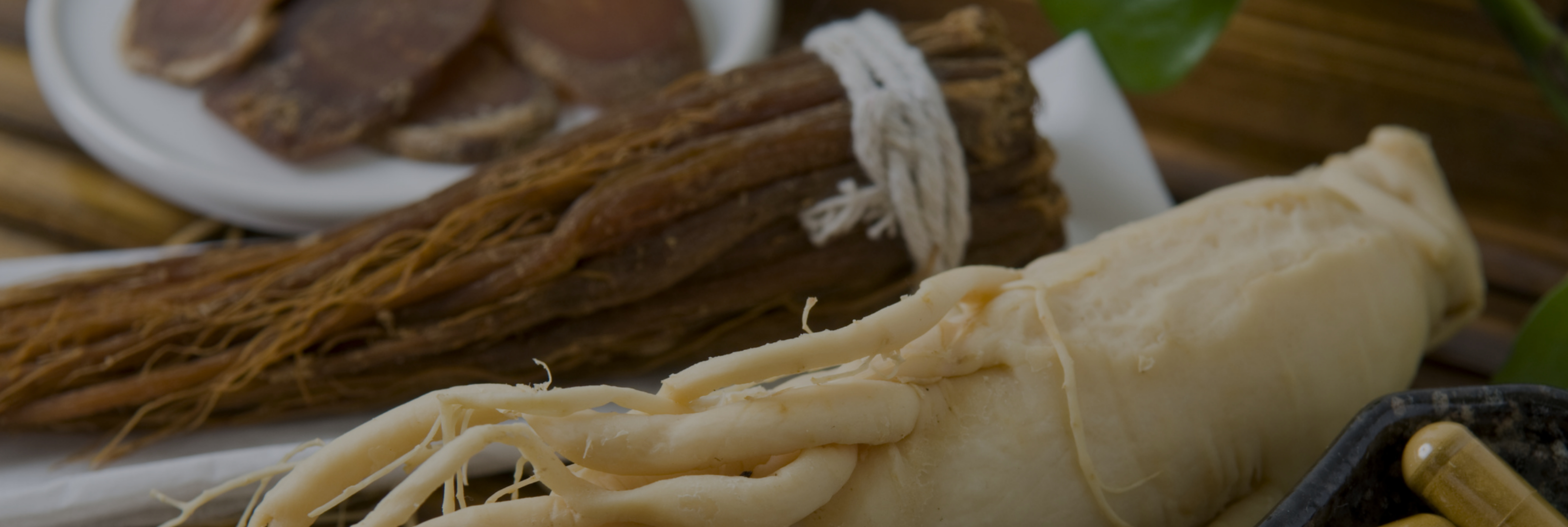At a glance
- Adaptogenic botanicals such as ashwagandha, astragalus, holy basil, eleutherococcus, rhodiola and schisandra have been used in traditional medicine for centuries.
- These botanicals act on the endocrine, metabolic, immune and neuropsychological systems.
- They help the body to adapt and restore physiological conditions of homeostasis.
- These botanicals are fortifying and help to deal with stress and anxiety, regulate hormones and the adrenal glands, in addition to boosting the immune system.
- Each of these main botanicals has its own specific properties, such as ashwagandha (anti-stress), astragalus (immune system booster), ginseng (energy booster), maca (hormonal balancer) and rhodiola (directed to vitality and concentration).
In countries where climatic conditions are often extreme, such as China, Russia, Siberia and India, nature has developed plants bursting with richness and resources: adaptogenic botanicals. Their properties are thought to have been used in ancient times to increase resistance to the cold and adapt to high altitudes, when oxygen becomes scarce and the body struggles to survive.
Today, these super-adaptogenic botanicals are extensively used in phytotherapy and nutraceuticals based on their ability to restore or maintain physical and mental balance.
What is an adaptogenic botanical?
Definition and origin of the 'adpatogenic botanical' concept
Botanicals such as ashwagandha, astragalus, holy basil, eleutherococcus, rhodiola and schisandra have been used in traditional medicine for centuries. In 1947, a Russian scientist, Nicolaï Lazarev, who was working on the ginseng mechanism of action and seeking to characterise it, defined the concept of an adaptogen as having the ability to increase an organism's non-specific resistance to stress. Then in 1968, another Russian researcher, Israel Brekhman, fine-tuned this definition (1) with three essential criteria inherent in a so-called adaptogenic botanical:
- the botanical must display complete innocuousness
- it must have a non-specific action which increases the body's overall resistance to all the different body systems
- and it must have a normalising action which encourages the body to respond in an appropriate way, using the minimum amount of energy (2)
This work laid the scientific foundations for studying the unique properties of certain botanicals.
Mechanisms of action of adaptogenic botanicals on the body
An adaptogenic botanical can help to restore health and improve overall well-being (3). At a time when many causes of stress lead to a chronic physiological reaction that exhausts the body's resources, the impact of adaptogenic botanicals (4) seem very promising.
An adaptogenic botanical is considered to act on a number of different areas:
- Endocrine system - normalises corticosteroid secretion, regulates the hypothalamic-pituitary-adrenal system and biological and circadian rhythms
- Immune system - regulates cortisol by strengthening the immune system
- Metabolic system - improves the cells' ability to use energy
- Neuropsychological system - improves performance and recovery after intellectual effort, enhances cognition, memory and emotional adaptation
Adaptogens can be defined as ‘substances that modulate distinct phases of the adaptation syndrome and reduce stress reactions in the alarm phase or delay/prevent the exhaustion phase and provide a certain degree of protection against long-term stress' (5).

Schisandra Chinensis
Benefits of adaptogenic botanicals
Adaptogenic botanicals and health: impact and benefits
Adaptogenic botanicals are thought to balance the body's fundamental physiological functions. Some have rich molecules and substances with sedative and anxiolytic properties. Specific parts of these botanicals, in the form of dried powders or extracts, have the capacity to produce an adaptogenic impact in the body, meaning that they help maintain or restore physiological homeostasis. This adaptogenic impact does not work with isolated molecules, but with galenic forms which focus on the totum of the botanical, i.e. the totality of its chemical compounds contained in the original botanical matrix. (6)
The medicinal botanicals that meet this definition enable the body to regain a state of equilibrium by increasing its resistance to various stress factors and promoting adaptation and survival. In a society where physical and mental stability is under strain, offering food supplements based on these botanicals represents a natural alternative for maintaining vitality.
Unlike stimulating botanicals, which are energising, adaptogens are fortifying.
Stress and anxiety management
Adaptogenic botanicals help the body to cope naturally with everyday challenges. Rhodiola helps reduce mental fatigue and improves concentration during periods of intense stress. Ashwagandha reduces cortisol levels and promotes restful sleep. Ginseng boosts physical and mental resistance to stressful situations.
Hormonal and adrenal regulation
Adaptogenic botanicals also play a crucial role in hormonal balance. They can optimise the function of the adrenal glands. Ashwagandha, for example, helps to maintain thyroid hormone production. Ginseng stimulates the secretion of ACTH, thereby promoting adrenal activity.
Other adaptogens such as rhodiola and Schisandra Chinensis are also involved in:
- improving insulin responsiveness
- modulating the production of oestrogen and progesterone
- supporting thyroid function
These synergistic impacts enable an overall hormonal balance to be restored, which is beneficial for long-term well-being.
Immune system support
Adaptogenic botanicals strengthen the body's natural defences by various mechanisms. Some, such as astragalus, increase the production of white blood cells and stimulate the activity of NK cells. Eleutherococcus improves the immune response to viral and bacterial threats.
The principal adaptogenic botanicals
Ashwagandha: anti-stress

Ashwagandha, or Withania Somnifera, stands out for its ability to significantly reduce cortisol, the stress hormone, and to reduce chronic stress, a factor in weakening the immune system. By balancing the nervous system, it indirectly promotes strong immunity.
This Indian botanical is also said to boost cognitive functions, helping to maintain concentration during periods of intense pressure. Its active compounds, withanolides, contribute to mood regulation and emotional stability.
Astragale: the immune booster

Astragalus stands out for its ability to stimulate the body's natural defences. Its polysaccharides and flavonoids activate the production of white blood cells, particularly T lymphocytes and macrophages. This action strengthens the immune response to pathogenic agents.
Studies have shown that astragalus increases resistance to respiratory and viral infections. It is particularly beneficial during winter or seasonal outbreaks.
Astragalus root also contains powerful antioxidants that protect immune cells from oxidative stress.
Ginseng: the energy booster

Ginseng, renowned for its revitalising properties, acts as a powerful natural stimulant. Its active compounds, ginsenosides, have a positive effect on cell metabolism and ATP production. This biochemical action results in a significant increase in physical and mental stamina.
Ginseng is also renowned for its powerful immunomodulatory impact. It regulates the production of cytokines and optimises the functioning of macrophages. This adaptogen helps the body to better resist seasonal infections.
Studies also show that ginseng optimises the use of blood glucose, thereby improving cognitive performance and concentration. It also regulates cortisol production, helping the body to better manage chronic stress.
Maca: the hormonal balancer

Maca, native to the Peruvian high plateaux, stands out for its ability to harmonise the endocrine system. This Andean root has a positive influence on the production of sex hormones in both men and women.
In women, maca is thought to reduce menopausal symptoms such as hot flushes and mood swings. It also promotes a regular menstrual cycle. For men, regular consumption of maca can increase sperm quality and support erectile function.
Maca also stimulates the thyroid gland, contributing to a balanced metabolism. Its action on the hypothalamo-hypophyseal system helps to regulate cortisol, improving the response to stress.
Rhodiola: for vitality and concentration

Rhodiola, native to the cold regions of Siberia, is renowned for its ability to boost cognitive performance. Its active compounds, in particular rosavins and salidroside, are believed to promote mental clarity and intellectual acuity.
This botanical increases cerebral oxygenation, improving short-term memory and mental alertness. Rhodiola also optimises the use of cellular energy, resulting in increased vitality and better physical endurance. Studies have shown its effectiveness in reducing the feeling of fatigue in athletes and workers exposed to harsh conditions.
Adaptogenic botanicals are beneficial in many ways, but we still don't know all their mechanisms. They can help to maintain general balance and harmonious long-term well-being. In our next article, you can find out more about the benefits of these botanicals in helping you get a good night's sleep.
Feel free to contact us
To see our entire product range, check out our online catalogue available 24 HOURS A DAY 7 DAYS A WEEK.
Sources :
(1) Brekhman II, Dardymov IV. New substances of plant origin which increase nonspecific resistance. Ann Rev Pharmacol 1968;8:419-30 https://www.annualreviews.org/content/journals/10.1146/annurev.pa.09.040169.002223
(2) Winston, 2007, p.20-23
(3) https://www.ema.europa.eu/en/human-regulatory-overview/herbal-medicinal-products
(4) Todorova V, Ivanov K, Delattre C, Nalbantova V, Karcheva-Bahchevanska D, Ivanova S. Plant Adaptogens-History and Future Perspectives. Nutrients. 2021 Aug 20;13(8):2861. doi: 10.3390/nu13082861. PMID: 34445021; PMCID: PMC8398443 https://pubmed.ncbi.nlm.nih.gov/34445021/
(5) https://www.researchgate.net/profile/Orlando-Petrini/publication/242579277_Le_ginseng_Donnees_cliniques_dans_des_situations_de_stress/links/00463529edaea15692000000/Le-ginseng-Donnees-cliniques-dans-des-situations-de-stress.pdf
(6) Botto, J.-M. Les phytoadaptogènes: une catégorie à part d’extraits de plantes aux propriétés pléiotropes d’adaptation à notre environnement. Phytothérapie, 2023, vol. 21, no 2-3, p. 75.
Aurélie Felix
Marketing Director







Leave a comment